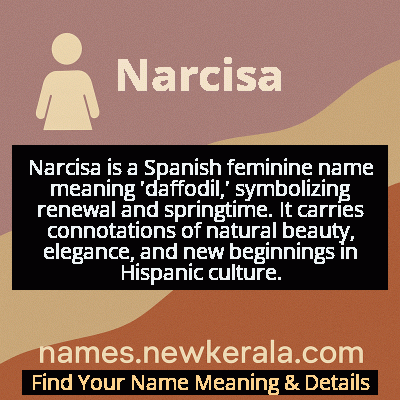Narcisa Name Meaning & Details
Origin, Popularity, Numerology Analysis & Name Meaning of Narcisa
Discover the origin, meaning, and cultural significance of the name NARCISA. Delve into its historical roots and explore the lasting impact it has had on communities and traditions.
Name
Narcisa
Gender
Female
Origin
Spanish
Lucky Number
2
Meaning of the Name - Narcisa
Narcisa is a Spanish feminine name meaning 'daffodil,' symbolizing renewal and springtime. It carries connotations of natural beauty, elegance, and new beginnings in Hispanic culture.
Narcisa - Complete Numerology Analysis
Your Numerology Number
Based on Pythagorean Numerology System
Ruling Planet
Moon
Positive Nature
Diplomatic, friendly, artistic, empathetic.
Negative Traits
Over-sensitive, moody, indecisive, prone to self-pity.
Lucky Colours
Green, cream, white.
Lucky Days
Monday.
Lucky Stones
Pearl, moonstone.
Harmony Numbers
1, 3, 4.
Best Suited Professions
Diplomats, mediators, caregivers, artists.
What People Like About You
Cooperative spirit, friendliness, artistic talent.
Famous People Named Narcisa
Narcisa de Jesús
Catholic saint
Canonized for her charitable works and spiritual devotion in Ecuador
Narcisa Freixas
Composer and pianist
Renowned Catalan composer of romantic music
Narcisa Amália
Poet and journalist
Pioneering Brazilian feminist writer and journalist
Narcisa de Leon
Film producer
Matriarch of Philippine cinema and studio owner
Name Variations & International Equivalents
Click on blue names to explore their detailed meanings. Gray names with will be available soon.
Cultural & Historical Significance
Throughout Latin America and the Philippines, Narcisa maintains a traditional presence, often appearing in older generations and aristocratic families. The name's connection to the daffodil flower gives it seasonal significance, associated with spring festivals and celebrations of new life. In literature and folk traditions, women named Narcisa are often portrayed as graceful, virtuous figures with strong family values. The name's usage reflects the enduring influence of Spanish colonial heritage while adapting to local cultural contexts across different regions.
Extended Personality Analysis
Women bearing the name Narcisa typically exhibit a blend of grace, intuition, and quiet strength. They often possess an innate appreciation for beauty in all forms, whether in nature, art, or human relationships. This aesthetic sensitivity frequently manifests in creative pursuits or a talent for creating harmonious environments. Narcisas are known for their compassionate nature and ability to provide emotional support to others, making them valued friends and confidantes. Their introspective quality allows them to understand complex emotional landscapes, both in themselves and those around them.
Despite their gentle exterior, Narcisas often demonstrate remarkable resilience and practical wisdom when facing challenges. They tend to approach problems with a balanced perspective, combining emotional intelligence with logical reasoning. This combination makes them effective mediators and advisors in personal and professional settings. Many develop strong intuitive abilities over time, learning to trust their instincts in decision-making. While they value peace and avoid unnecessary conflict, they can be surprisingly assertive when defending their principles or protecting loved ones. Their personality often reflects the symbolic duality of the daffodil—appearing delicate while possessing the strength to push through hard ground toward the light.
Modern Usage & Popularity
In contemporary naming practices, Narcisa has become increasingly uncommon, though it maintains a niche presence among families with strong Hispanic heritage or those seeking vintage floral names. The name experienced its peak popularity during the early to mid-20th century and has since declined significantly in most Spanish-speaking countries. However, it occasionally appears in birth registries, particularly in rural areas of Spain, Mexico, and parts of South America where traditional names remain valued. The name's rarity today gives it a distinctive quality that appeals to parents looking for unique yet culturally grounded options. Some modern parents are rediscovering Narcisa as part of the vintage name revival trend, appreciating its botanical symbolism and elegant sound. In the Philippines, where Spanish names retain cultural significance, Narcisa continues to be used, though less frequently than in previous generations.
Symbolic & Spiritual Meanings
Symbolically, Narcisa embodies the essence of renewal, self-discovery, and natural beauty through its connection to the daffodil flower. The daffodil's emergence in early spring represents new beginnings, hope, and the triumph of life over winter's dormancy. This cyclical symbolism extends to personal growth and the ability to reinvent oneself after difficult periods. The name also carries meanings of self-reflection and introspection, referencing the mythological Narcissus but transforming this narrative into a positive journey of self-awareness and personal development. In various cultural traditions, the daffodil symbolizes respect, chivalry, and creativity, while its golden color represents sunshine, joy, and positive energy. The name suggests a harmonious balance between appreciating one's own qualities and maintaining compassion for others, encouraging both self-love and outward generosity.

